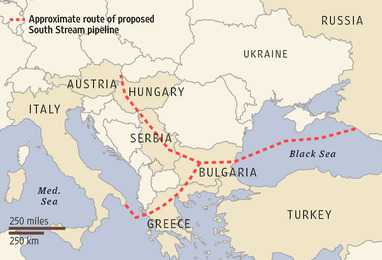By JACOB GRONHOLT-PEDERSEN

MOSCOW—Russia secured approval from Turkey on Wednesday to build the South Stream gas pipeline across the Black Sea, removing the last major obstacle to proceed with a project that could increase Europe’s dependence on Russian natural-gas supplies.
The move heats up the battle between Russia and the European Union over competing pipelines, especially the European Union-backed Nabucco project, and increases pressure on Ukraine to give Moscow control of its pipeline system.
[SOUTHSTREAM]
Turkey’s approval, given by Energy Minister Taner Tildiz during talks with Russian Prime Minister Vladimir Putin in Moscow on Wednesday, had been a stumbling point for Russia to proceed with the offshore part of the South Stream project.
Russian state gas giant OAO Gazprom ships most of its gas exports to Europe via Ukraine, but supply disruptions in recent years due to pricing disagreements between the two countries have led Russia to seek to bypass Ukraine and promote new pipelines such as South Stream.
Analysts say progress on South Stream increases pressure on Ukraine. Kiev is pushing for cheaper gas in order to balance its budget.
But in exchange for cheaper gas, Moscow is aiming to gain control of Ukraine’s pipeline system.
South Stream is envisioned to carry as much as 63 billion cubic meters of Russian gas under the Black Sea to Bulgaria, Serbia and Hungary before branching out to Western Europe.
Gazprom, the main shareholder in the project and a major supplier of gas to Europe, said Turkey’s approval means South Stream will start operating according to plan by the end of 2015. ENI SpA of Italy, BASF SE of Germany and Électricité de France SA are minority partners in the project.
“This is a very good and positive signal for all of us, which undoubtedly will provide stability in energy supplies to the European market,” said Mr. Putin.
A European Commission spokesman played down the impact of the South Stream agreement, which he said “would not affect the existing framework and commitments.”
European officials say that, unlike Nabucco, South Stream hasn’t reached the project stage yet.
Nabucco is the most ambitious and expensive of four competing proposals to take gas from Azerbaijan, and possibly eventually from other countries, into the European Union. But Nabucco’s estimated cost is a potential deterrent for developers of the giant gas field, which lies under the Caspian Sea. A decision on the winning project is expected to be announced in the first half of 2012.
Gazprom has insisted South Stream will be built regardless of talks with Ukraine, but Gazprom Chief Executive Alexei Miller said earlier this week that realization of South Stream depends on the continuing talks with Kiev.
“This all looks like negotiating tactics, as Russia prepares for a new round of talks with Ukraine,” said Johannes Benigni, managing director at Vienna-based research consultant JBC Energy. “I don’t think they need to build South Stream at all.”
Last month, another transit country, Belarus, sold its gas-pipeline operator Beltransgaz to Gazprom in exchange for a major discount on gas supplies. Ukraine is likely to face a similar situation, Mr. Benigni said, adding that with a $15.5 billion price tag on South Stream it would make more sense for Gazprom to invest its money in Ukraine.
The news on Russian progress on South Stream also comes as the Nabucco project, which seeks to carry gas from Azerbaijan and other Central Asian countries to Europe, has faced hurdles. The EU has promoted Nabucco to reduce the bloc’s dependence on Russia but suffered a setback as Azerbaijan recently said it plans to build its own pipeline through Turkey that would run parallel to Nabucco’s planned route.
South Stream has failed to gain backing in Brussels and has still to get exemptions from new EU rules known as the Third Energy Package. The legislation is pushing for more competition in Europe’s energy market and has sparked tensions with Russia as Moscow believes they undermine its own investments in the 27-nation EU, including South Stream.
—Laurence Norman and Alessandro Torello
via Turkey Approves Russian Gas Plan – WSJ.com.

Leave a Reply